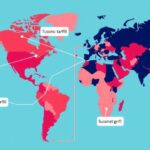Analyzing the U.S. Auto Industry’s Defensive Strategy Against China’s Expansion
The article examines the defensive position of the American auto industry in response to President Trump’s tariffs and the aggressive expansion of China’s auto sector. Analyst Michael Dunne emphasizes the need for a proactive approach to compete globally, while Senator Bernie Moreno critiques past U.S. trade policies that weakened American manufacturers.
The article discusses the challenges faced by the American auto industry in light of President Trump’s tariff policies and the rise of China’s auto sector. Analyst Michael Dunne compares the situation to a defensive strategy, emphasizing that China is currently on the offensive in the global market. He notes that tariffs imposed by the Trump administration create obstacles for American automakers, especially in competing within China.
China’s auto industry has become the world’s leading exporter, with a significant portion of its exports being traditional gasoline vehicles. Dunne highlights that the cost of assembling cars in China is considerably lower than in the United States, causing American companies to falter in this competitive landscape. Moreover, Trump’s tariffs on various imports, including those from traditional allies, might not effectively revitalize the American auto sector or curtail its loss of market share in China.
The article also features insights from Senator Bernie Moreno, who criticizes previous U.S. administrations for allowing China to erect trade barriers that hinder American competitiveness. Moreno supports Trump’s tariffs but cautions against the potential ramifications on domestic consumers, particularly regarding the affordability of vehicles subject to tariffs. Dunne concludes that merely relying on defensive tactics will not suffice; instead, a proactive approach is required to regain ground in the auto industry and ensure that American workers can afford the vehicles they manufacture.
In summary, the article sheds light on the competitive landscape of the global auto industry, where the United States finds itself on the defensive against China’s ascendance. The tariffs imposed by President Trump may offer temporary relief; however, they are unlikely to resolve the underlying issues the American automakers face. A shift towards a more aggressive strategy is essential for the United States to reclaim its position in the auto market and support American workers effectively.
Original Source: www.detroitnews.com








Post Comment